6 12 32 52 (2n 1)2 = n(2n 1)(2n 1) 3 Proof For n = 1, the statement reduces to 12 = 1 3 3 3 and is obviously true Assuming the statement is true for n = k 12 32 52 (2k 1)2 = k(2k 1)(2k 1) 3;Solve Quadratic Equation by Completing The Square 32 Solving n2n2 = 0 by Completing The Square Add 2 to both side of the equation n2n = 2 Now the clever bit Take the coefficient of n , which is 1 , divide by two, giving 1/2 , and finally squareCourse Title AMS 301;

Number Series Calculator Amazon Co Uk Apps Games
Prove that 2^n+2^n-1/2^n+1-2^n=3/2
Prove that 2^n+2^n-1/2^n+1-2^n=3/2- Our task is to find the sum of series 1^2 3^2 5^2 (2*n 1)^2 for the given value of n Let's take an example to understand the problem, Input − n = 5 Output − 84 Explanation − sum = 1^2 3^2 5^2 7^2 9^2 = 1 9 25 49 = 84 A basic approach to solve this problem is by directly applying the formula for the sumProve 1 Show that is true for and 2 Assume is true for some positive integer , then show




Data Center Redundancy 2n N 1 2 N 1 Explained 123net
An efficient approach is to find the 2^(n1) and subtract 1 from it since we know that 2^n can be written as 2 n = ( 2 0 2 1 2 2 2 3 2 4 2 n1) 1 Below is the implementation of above approach So it is like (N1)/2 * N Share Improve this answer Follow answered Mar '10 at 1712 gius gius 8,516 3 3 gold badges 30 30 silver badges 59 59 bronze badges Add a comment 5 I know that we are (n1) * (n times), but why the division by 2?Finding powers 2 i close to powers b j of other numbers b is comparatively easy, and series representations of ln(b) are found by coupling 2
Theorem The sum of the first n powers of two is 2n – 1 Proof By inductionLet P(n) be "the sum of the first n powers of two is 2n – 1" We will show P(n) is true for all n ∈ ℕ For our base case, we need to show P(0) is true, meaning the sum of the first zero powers of two is – 1 Since the sum of the first zero powers of two is 0 = – 1, we seeThe equation is 124 2 (n1) = 2 n 1 Prove the statement for n = 1 Left hand side (LHS) expression = 2 (n1) = 2 (11) = 2 0 = 1 Right hand side (RHS) expression = 2 n 1 = 2 1 1 = 2 1 = 1 Since LHS = RHS, for n = 1 the statement is true Explanation using the method of proof by induction this involves the following steps ∙ prove true for some value, say n = 1 ∙ assume the result is true for n = k ∙ prove true for n = k 1 n = 1 → LH S = 12 = 1 and RHS = 1 6 (1 1)(2 1) = 1 ⇒result is true for n = 1
Prove by mathematical induction that above statement holds true for every integer n belongs to N HINTto prove that 11/2^ (k1) Answer by ramkikk66 (644) ( Show Source ) You can put this solution on YOUR website!(12 n)^2 expand it 2 See answers Master0709 Master0709 Stepbystep explanation 14n²4n is the expanded form of this question himanshugoswami43 himanshugoswami43 ~~ (12n)² (12n)*(12n) 12n2n4n (i) AB एक उध्र्वाधर दीवार है, जिसका B भाग भूमि के संपर्क में है एवं बिंदु पर टिकी हुई है यदि तो सीढ़ी की लम्बाई ज्ञात कीजिए (ii) 10m ऊँचे एक खंबे को सीधा खड़ा



Http Maths Dur Ac Uk Dma0wjz B1 Anp1 Pdf




How Prove This Sum K 1 2 N 1 Sigma 2 N 2k 1 Sigma 2k 1 8 N 1 Mathematics Stack Exchange
Sol 1 2 2 2 n 1 2 n2 nn 12n 16 Basic step put n111 True Inductive step ii nk1 2 from COMPUTER S DISCRETE at Capital University of Science and Technology, Islamabad2/3 (1n)=1/2n Simple and best practice solution for 2/3 (1n)=1/2n equation Check how easy it is, and learn it for the future Our solution is simple, and easy to understand, so don`t hesitate to use it as a solution of your homework If it's not what You are looking for type in the equation solver your own equation and let us solve it Click here 👆 to get an answer to your question ️ Simplify 2 ^n 2 ^n1 ÷ 2^n1 2^n opponent opponent Math Secondary School answered Simplify 2 ^n 2 ^n1 ÷ 2^n1 2^n 2 See answers Brainly User Brainly User



How To Prove That Math Frac 2 N 2 N 1 2 N 1 2 N 3 2 Quora



Finding The Sum Of Consecutive Numbers
In the induction hypothesis, it was assumed that $2k1 < 2^k,\forall k \geq 3$, So when you have $2k 1 2$ you can just sub in the $2^k$ for $2k1$ and make it an inequalityClick here👆to get an answer to your question ️ 1n 2(n 1) 3(n 2) (n 1)2 n1 =Active 4 years, 4 months ago Viewed 1k times 1 I've been trying to work this out but am having little luck n here is an integer Ive found that Γ ( n 1 / 2) = 1 2 Γ ( n − 1 / 2) But I am unsure how to handle Γ when it holds a negative value complexanalysis gammafunction Share




If N Is A Positive Integer Prove That 1 2n 2n 2n 1 2 2n




How To Prove A Formula For The Sum Of Powers Of 2 By Induction Mathematics Stack Exchange
Program for finding the sum of the nth term of the series (n^21^2) 2(n^22^2) 3(n^23^2) n(n^2n^2) Examples Input 2 Output 3 Input 5 Output 150 Recommended Please try your approach on first, before moving on to the solution To solve this problem we have the formula ((1/4)*n 2 *(n 21)) We can prove the formula using1^2 2^2 3^2 n^2 = n(n1)(2n1)/6 for all positive integral values of n Answer by solver() (Show Source) You can put this solution on YOUR website!Well 123n = (n)(n1)/2, so if you only want sum then you can easily do following codenum = int(input('Enter n ')) print ((num*(num1))//2) /codeIf you don




Number Sequences Lecture 7 Sep 27 Chapter 4 1 Of The Book And Chapter Of The Notes Overhang Ppt Download




Squared Triangular Number Wikipedia
Prove that 122 2 2 3 2 n1 = 2 n 1 for n = 1, 2, 3, There are two steps in a proof by induction, first you need to show that the result is true for the smallest value on n, in this case n = 1 When n = 1 the left side has only one term, 2 n1 = 2 11 = 2 0 = 1 The right side is 2 n 1= 2 1 1 = 1 Thus the statement is true for suppose s 1 2 3 n term also s n n 1 n 2 3 2 1 adding that 2s n 1 n 1 n 1 n 1 n 1 n 1 n 1 2s Answer added by Md Mozaffor Hussain Mozaffor, Assistant Teacher , BIAMSum of n, n², or n³ n n are positive integers Each of these series can be calculated through a closedform formula The case 5050 5050 5050 ∑ k = 1 n k = n ( n 1) 2 ∑ k = 1 n k 2 = n ( n 1) ( 2 n 1) 6 ∑ k = 1 n k 3 = n 2 ( n 1) 2 4




Show That 2ncn 2 N 1 3 5 2n 1 N Brainly In



Www Hillcrest Bham Sch Uk Site Data Files Documents Knowledge organisers Maths Year 10 F23d7aaf032ec3ecace Pdf
Because each term (1 2 3 n) is a triangular number with a value of n(n1)/2 = 1/2(n^2 n) Now, the sum of the first n triangular numbers is the sum from 1 to n of 1/2(n^2n) The sum from k=1 to n of n^2 is n(n1)(2n1)/6 and the sum fRearrange the equation by subtracting what is to the right of the equal sign from both sides of the equation 2/3* (1n) (1/2*n)=0Answer to Use mathematical induction to prove that the following formula is true for all natural numbers, n 1^2 3^2 5^2 (2n1)^2 =



Key Concepts In Computer Science Assignment 10 All Test Answers




Number Series Calculator Amazon Co Uk Apps Games
We have proved the contrapositive, so the original statement is true Note that if n is of the form 2^k, then n's prime factorization is only composed of 2's Thus, the contrapositive of the original statement is as follows n = b* (2^k), where b is a positive odd number ==> 2^n 1 is composite Let n = b* (2^k)I would suggest the following approach First consider (2 n − 1) (2 n 1) = 4 n 2 − 1 hence we have 4 ⋅ 2 n − 1 n 2 2 = 2 n − 1 4 n 2 8 = 2 n − 1 4 n 2 − 1 2 n − 1 9 = 2 n 1 2 n − 1 9To prove that To prove it using induction 1) Confirm it is true for n = 1 It is true since 1/2 = 1/2^1 2) Assume it is true for some value of n = k ie > eqn (1) 3) Now prove it is true for n = k1 ie the sum up to (k1) terms = 1 1/2^ (k1) Proof For n




Example 2 What Is th Term Of An N 1 2 N 3 N
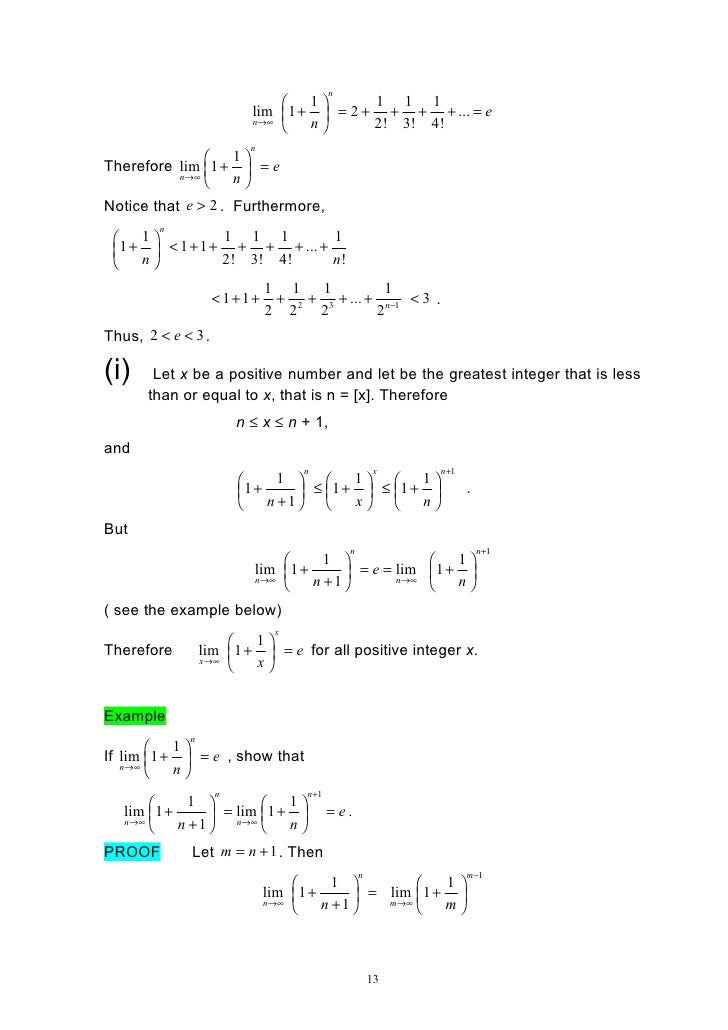



Mth3101 Advanced Calculus Chapter 2
This is the Solution of Question From RD SHARMA book of CLASS 11 CHAPTER SEQUENCES AND SERIES This Question is also available in R S AGGARWAL book of CLASS 1Simple and best practice solution for (n1)(n2)(n3)=1 equation Check how easy it is, and learn it for the future Our solution is simple, and easy to understand, so don`t hesitate to use it as a solution of your homeworkProof As with any infinite series, the sum is defined to mean the limit of the partial sum of the first n terms = as n approaches infinity By various arguments, one can show that this finite sum is equal to = As n approaches infinity, the term approaches 0 and so s n tends to 1 History Zeno's paradox This series was used as a representation of many of Zeno's paradoxes
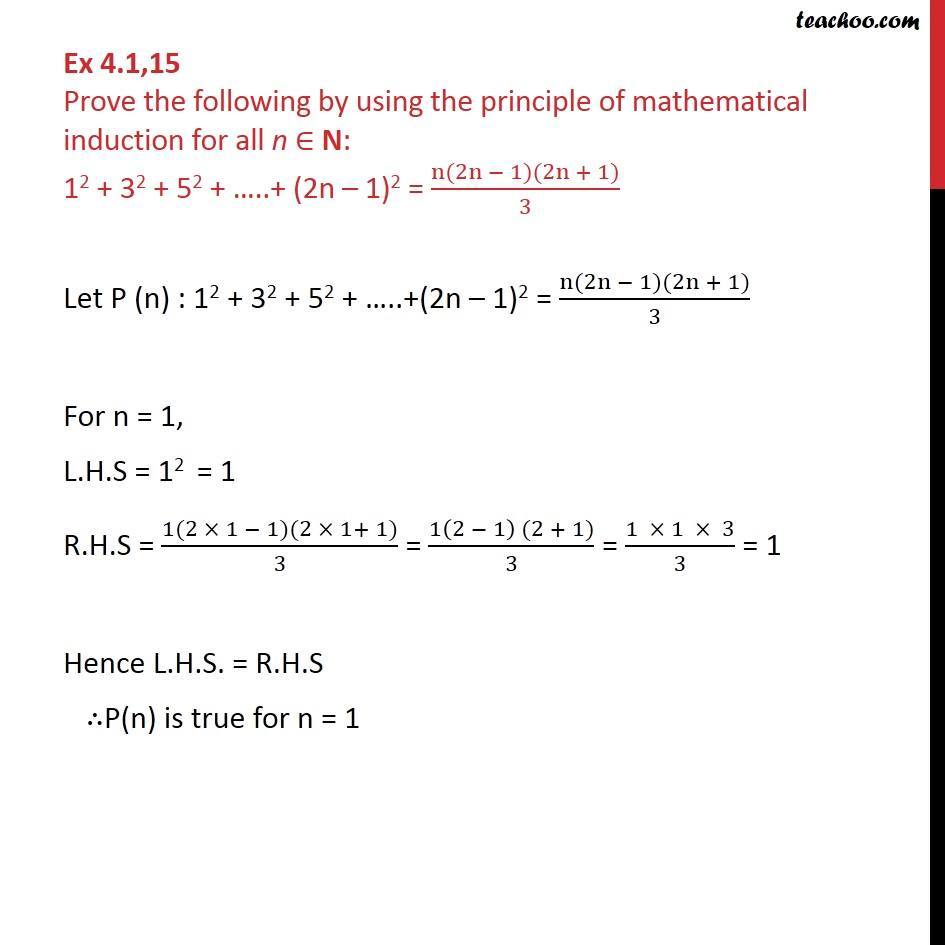



Ex 4 1 15 Prove 12 32 52 2n 1 2 Chapter 4 Induction




Data Center Redundancy 2n N 1 2 N 1 Explained 123net
(11) we will prove that the statement must be true for n = k 1 12 32 52 2(k 1) 12 = (k 1)2(k 1) 12(k 1) 1It's only (n 1) * n if you use a naive bubblesort You can get a significant savings if youTo do this, we will fit two copies of a triangle of dots together, one red and an upsidedown copy in green Eg T (4)=1234
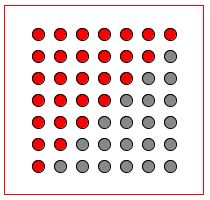



Triangular Numbers In A Square



Www Maths Ox Ac Uk System Files Attachments Induction 0 Pdf
Uploaded By UltraProton4291 Pages 62 Ratings 100% (1) 1 out of 1 people found this document helpful; Transcript Prove 1 2 3 n = (n(n1))/2 for n, n is a natural number Step 1 Let P(n) (the given statement)\ Let P(n) 1 2 3 n = (n(n1))/2 StepAssuming you mean sum of 1/2 n, then I think you have the correct idea but the formatting is bad in your post I think you mean 1/2 n1 *2 n /1=2 n /2 n1 =21 =1/2 for the general term of the ratio sequence which obviously converges to 1/2 which is less then 1 so the sum converges by ratio test
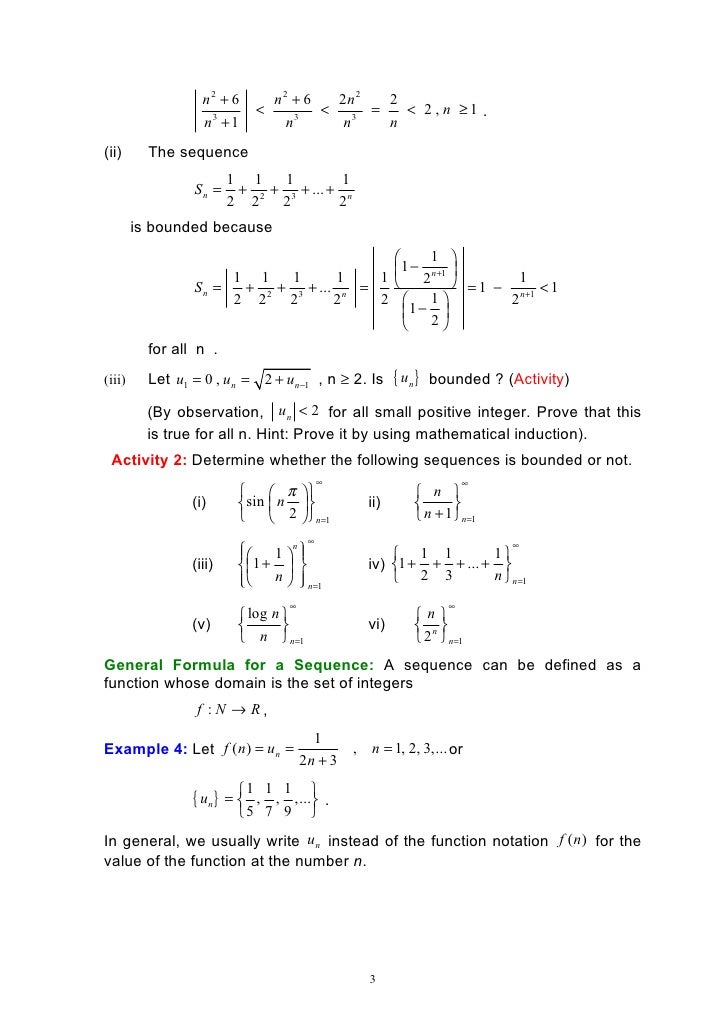



Mth3101 Advanced Calculus Chapter 2



1 2 1 4 1 8 1 2 N 1 1 2 N Sarthaks Econnect Largest Online Education Community
A n 2 a n 1 2 n 1 a n 2 n n x 2 n 1 13 a n 2 a n 1 a n 2 10 x 2 k a n 960 n A n 2 a n 1 2 n 1 a n 2 n n x 2 n 1 13 a n 2 a n 1 a School Stony Brook University;The reason that {eq}2^n = 2^{n1} 2^{n1} {/eq} can be explained using some rules of exponents and a bit of algebra These rules are as follows See full answer belowSimplify (2^ (n1))/ ( (2^n)^ (n1)) 2n1 (2n)n−1 2 n 1 ( 2 n) n 1 Reduce the expression by cancelling the common factors Tap for more steps Multiply the exponents in ( 2 n) n − 1 ( 2 n) n 1 Tap for more steps Apply the power rule and multiply exponents, ( a m) n



Key Concepts In Computer Science Assignment 10 All Test Answers



1
In a third layer, the logarithms of rational numbers r = a / b are computed with ln(r) = ln(a) − ln(b), and logarithms of roots via ln n √ c = 1 / n ln(c) The logarithm of 2 is useful in the sense that the powers of 2 are rather densely distributed; 21 For the proof, we will count the number of dots in T (n) but, instead of summing the numbers 1, 2, 3, etc up to n we will find the total using only one multiplication and one division!Simplify each term Tap for more steps Rewrite using the commutative property of multiplication 2 n ⋅ n n ⋅ − 2 − 1 ( 2 n) − 1 ⋅ − 2 2 n ⋅ n n ⋅ 2 1 ( 2 n) 1 ⋅



1



How To Prove That Math Frac 2 N 2 N 1 2 N 1 2 N 3 2 Quora
For first n natural numbers we have the following results with usual notations r = 1 ∑ n r = 2 n (n 1) , r = 1 ∑ n r 2 = 6 n (n 1) (2 n 1) , r = 1 ∑ n r 3 = (r = 1 ∑ n r) 2 If a 1 a 2 a n ∈ A P then sum to n terms of the sequence a 1 a 2 1 , a 2 a 3 1 , a n − 1 a n 1 is equal to a #b_n=1/(12^n)# We can also drop the constant #1# from the denominator This will not drastically change the behavior of #b_n# in terms of it being larger than #a_n# #b_n=1/2^n=(1/2)^n# Now, we know the series #sum_(n=1)^oo(1/2)^n# converges as it is a geometric series with the common ratio #r=1/2Variable n cannot be equal to 1 since division by zero is not defined Multiply both sides of the equation by 2\left(n1\right), the least common multiple of 2,n1,2\left(n1\right)



How To Evaluate The Sum Of N 2 2 N From N 1 To Infinity Quora



Http Www Columbia Edu Md3405 Proofs solutions Pdf
Transcribed Image Textfrom this Question n22 (n 1)2 (n 2)27 3 (8 points) Let n be a positive integer Let A, be the 3 x 3 matrix ( (n 1)2 (n 2)2 (n 3)2 (n 2) (n 3)2 (n 4)) Show that the determinant of An is 8 The whole point of Problem 3 is to show that you get the same answer no matter which n you use, so checking only a2^n n Numbers This article is about numbers, that is, numbers that are produced by replacing ' ' in with a positive integer I came across these numbers while studying Mersenne numbers It got me thinking about numbers, if there are any interesting properties to them, and what are the properties ofAnswer to Prove that 1^2 2^2 3^2 n^2 = n(n 1)(2n Transcribed image text Prove that 1^2 2^2 3^2 n^2 = n(n 1)(2n 1)/6 for n greaterthanorequalto 1 Prove that 1^2 3^2 5^2 (2n 1)^2 = (n 1)(2n 1)(2n 3)/3 when n is a nonnegative integer
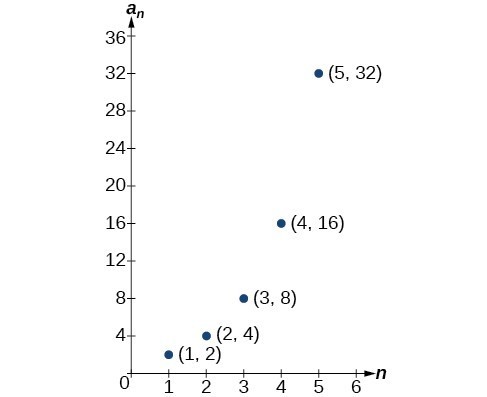



Sequences Defined By An Explicit Formula College Algebra
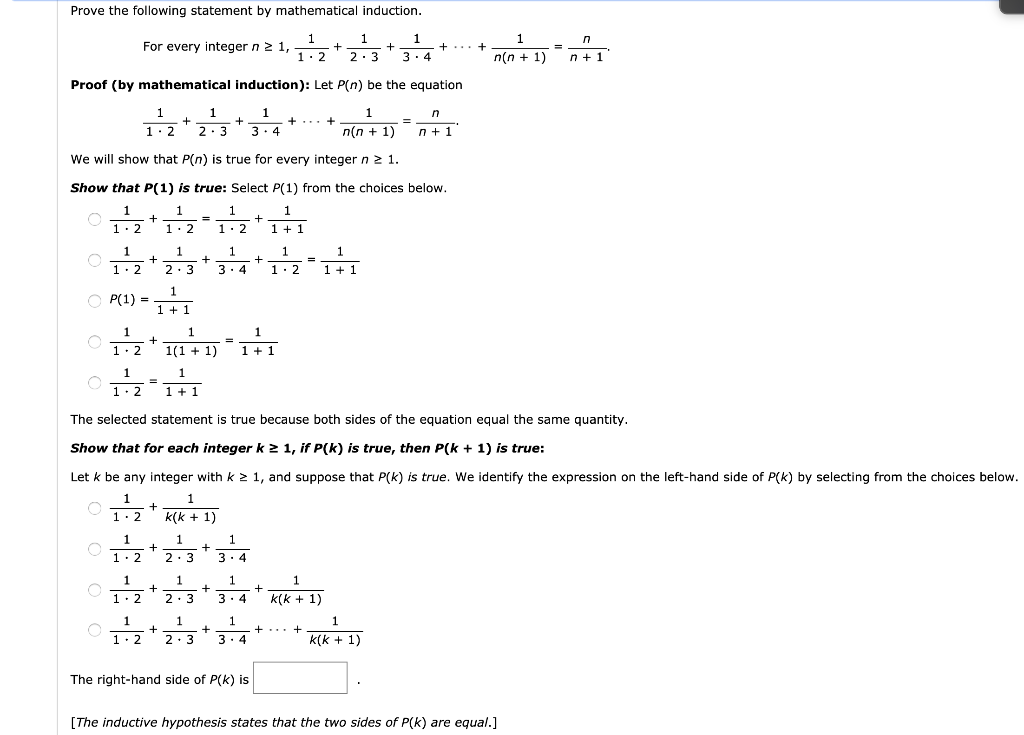



Prove The Following Statement By Mathematical Chegg Com
Simlly, for the Divisor of the fraction we've 2^ (n 1) 2^n = 2^n * 2^1 2^n = 2^n (2 1) hence, the fraction becomes = 2^n (1 1/2)/2^n (2 1) = (11/2)/ (2 1) = (3/2)/1 = 3/2 Option 4 is the correct answer therefore, the value 2^n 2^ (n1) / 2^ (n1) 2^n is 3/2 Example 1 For all n ≥ 1, prove that 12 22 32 42 n2 = (n(n1)(2n1))/6 Let P (n) 12 22 32 42 n2 = (n(n1)(2n1))/6 For n = 1, LHS = 12 S = n * (n 1) * (2*n 1) / 6 It is easy to prove this using induction Share Improve this answer Follow edited Aug 1 '12 at 1745 answered Aug 1 '12 at 1033 Johan Råde Johan Råde 185k 19 19 gold badges 62 62 silver badges 103 103 bronze badges Add a comment




Python Program To Calculate Sum Of Series 1 2 3 N




Wallis Product Wikipedia



Faculty Math Illinois Edu Hildebr 213 Inductionsampler Pdf
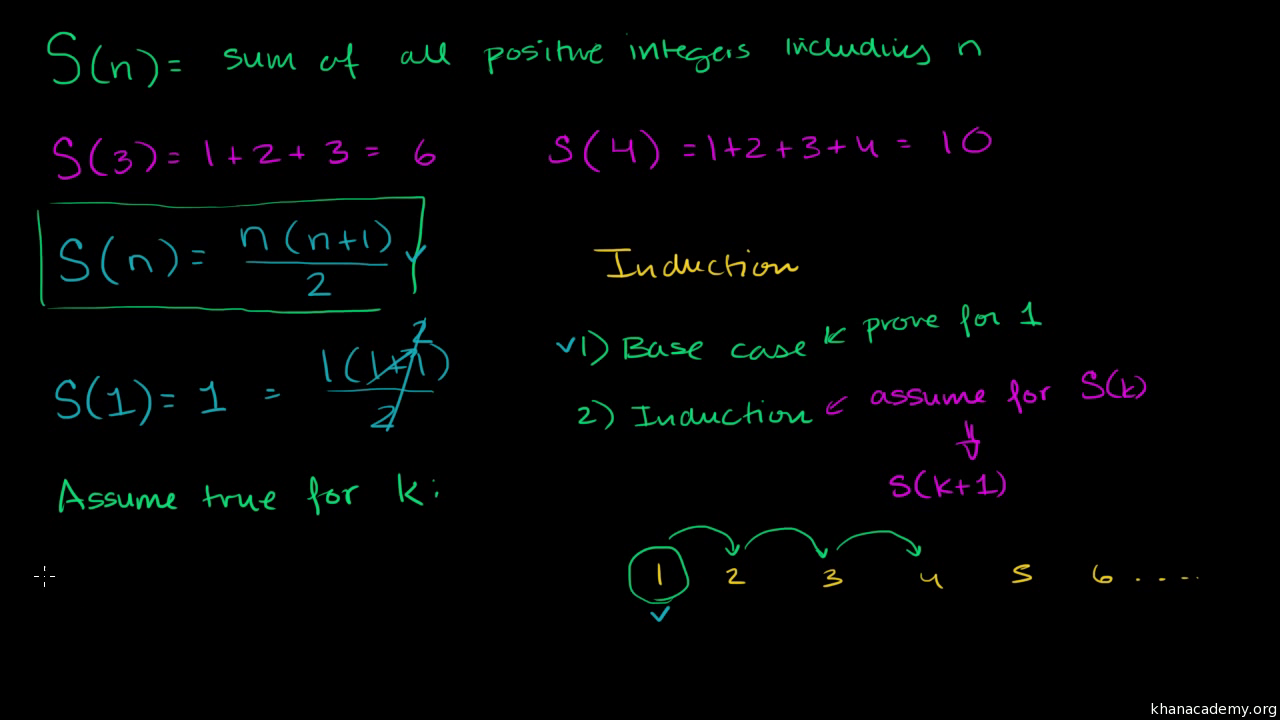



Proof Of Finite Arithmetic Series Formula By Induction Video Khan Academy
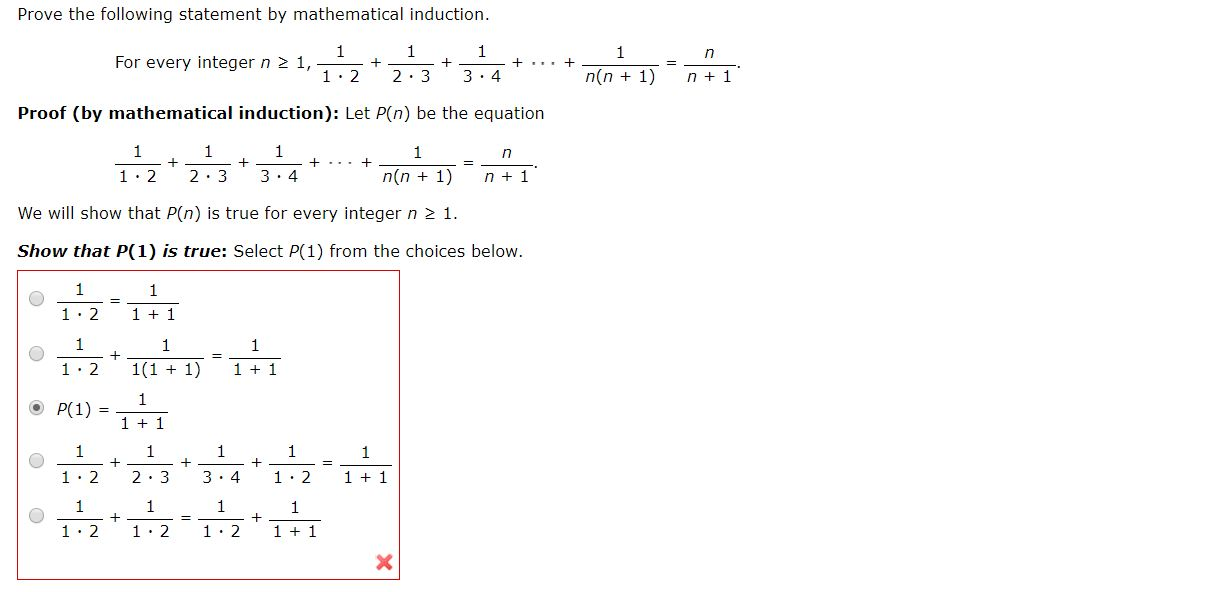



Prove The Following Statement By Mathematical Chegg Com




How To Derive N 1 2 From 1 2 3 N N Quora




Is There Any Elementary Formula For The Sequence Sum K 1 N Left 2k 1 Right Left Frac 1 2 Right K Mathematics Stack Exchange




Proof That 2 N 1 2 N 1 With Mathematical Induction Youtube



Http Edshare Soton Ac Uk Id Document 7014




Stirling Numbers Of The Second Kind Wikipedia




Lim N Oo 1 N 2 N 1 3 N 2 N 1 1 2 2 2 3 2 N 2




Infinite Series



Binomial Formula Explained
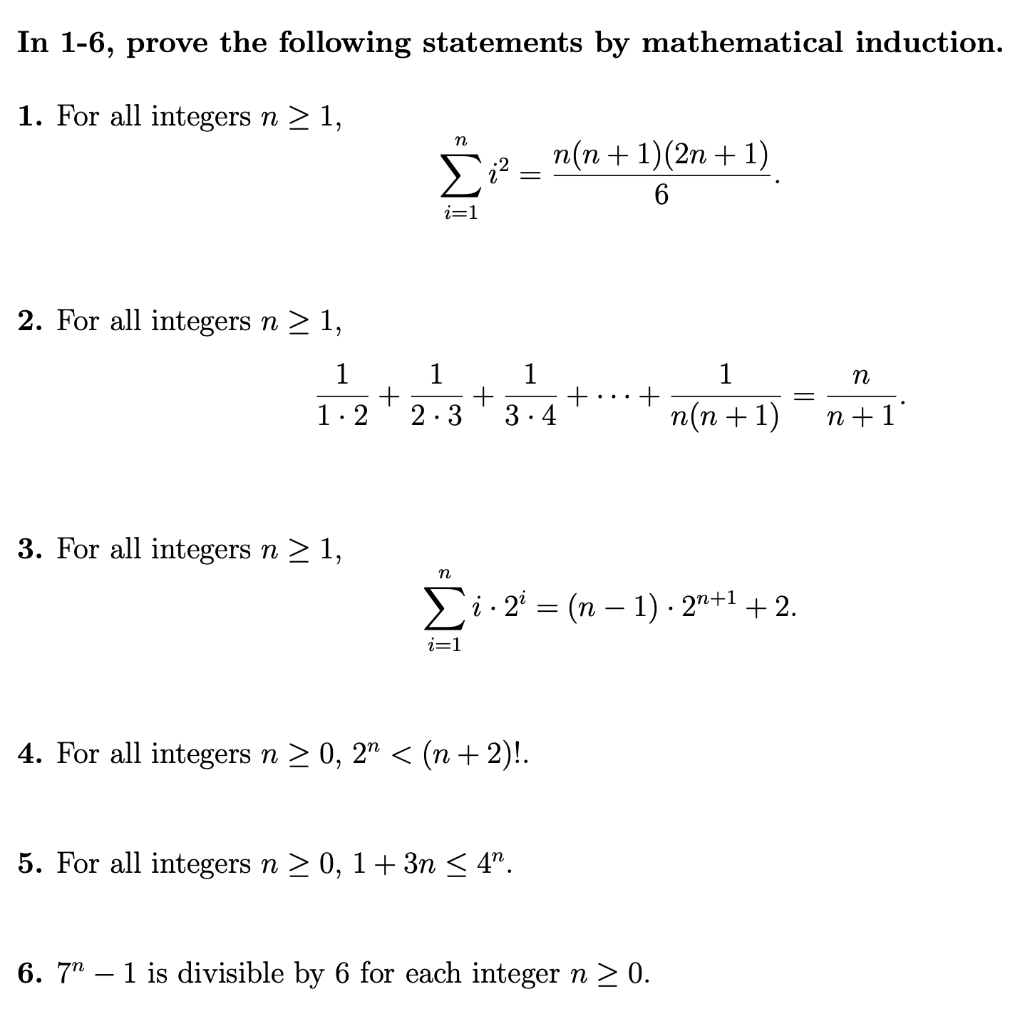



In 1 6 Prove The Following Statements By Chegg Com




Simplify 2 N 2 N 1 2 N 1 2 N Brainly In




n2 Formula



3



Establish A Formula For 1 1 4 1 1 9 1 1 N 2 Stumbling Robot




Art Of Problem Solving




Prove That 5 2n 1 3 2n 1 2 2n 1 Is Divisible By 15 For N In Mathbb N Mathematics Stack Exchange



Corbettmaths Com Wp Content Uploads 02 Proof Pdf




Sum To N Terms 1 N 2 N 1 3 N 2 Youtube




Art Of Problem Solving




An Introduction To Mathematical Induction The Sum Of The First N Natural Numbers Squares And Cubes Math Wiki



Www Colorado Edu Amath Sites Default Files Attached Files Wallis Stirling2 Pdf




Prove That 2n 1 N 2 N1 3 5 2n 1 2n 1



Prove By Mathematical Induction 1 2 2 2 3 2 N 2 N N 1 2n 1 6 N N Sarthaks Econnect Largest Online Education Community




Prove By Pmi That 1 2 2 3 3 4 N N 1 N N 1 N 2 3 N In N Youtube



Www3 Nd Edu Apilking Math Work Old exams Exams s14 Exam 3s14 solutions copy Pdf
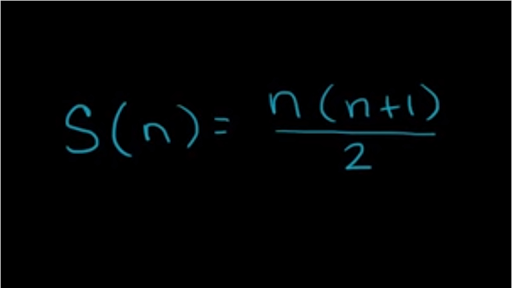



Proof Of Finite Arithmetic Series Formula By Induction Video Khan Academy



Http Edshare Soton Ac Uk Id Document 5512




Solve 1 3 2 3 3 3 N 3 14 N 2 N 1 2



2



Prove That The Sum From 1 To Of 1 N2 1 3 4 Stumbling Robot



1



Prove That The Sum From 1 To Of 2n 1 N2 N 1 2 1 Stumbling Robot




If T N 1 4 N 2 N 3 For N 1 2 3 Then 1 T 1 1 T 2 1 T




A Limit Involving Binomial Coefficients Lim N To Infty 1 N Sum K 1 N 1 K N Choose K 1 K Frac12 Mathoverflow




Proof Without Words 1 2 N 1 N Choose 2 Wolfram Demonstrations Project




Proof By Induction Wolfram Demonstrations Project



Users Math Msu Edu Users Zhan Hw1 Solution Pdf




n2 Formula Proof



n2 Formula Proof



Http Www Macs Hw Ac Uk Foss F71sm1 Calculus Selected Solutions Pdf




n2 Formula Proof




Prove 2n 7 N 3 2 For N N




Principle Of Mathematical Induction Class Xi Exercise 4 1 Part 1 Breath Math
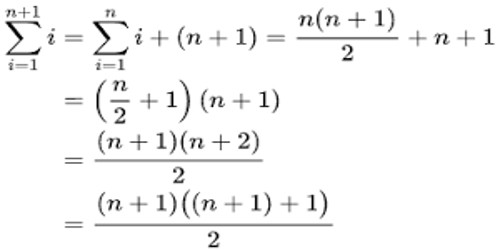



Induction Proof Problems With Solutions Assignment Point
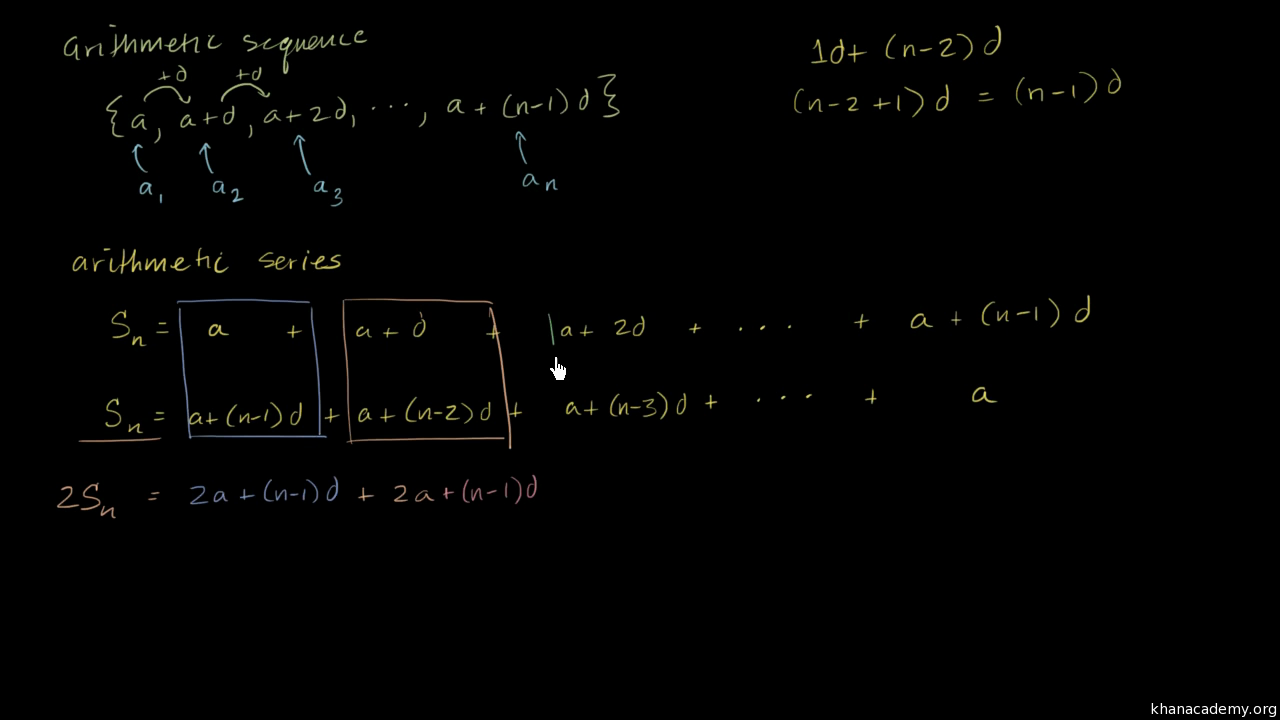



Arithmetic Series Formula Video Series Khan Academy
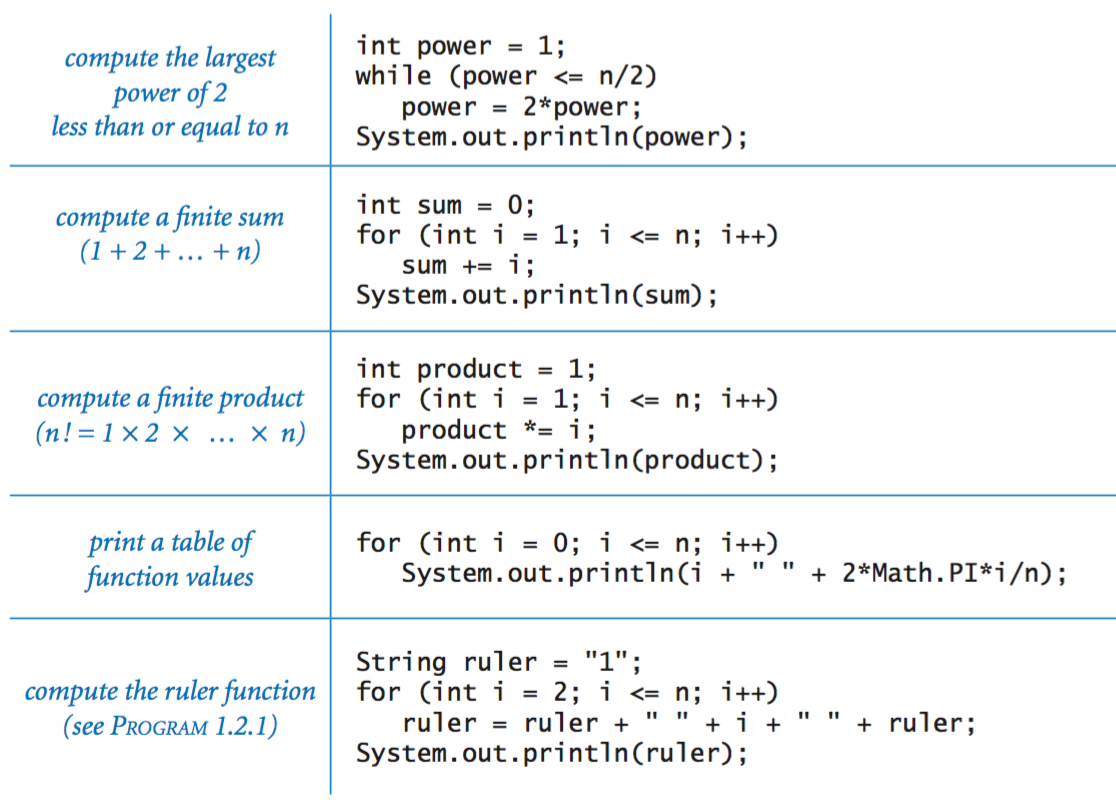



Conditionals And Loops




Unrolling Method For T N 1 When N 0 And 2t N 1 1 Stack Overflow




How To Prove That Math Frac 2 N 2 N 1 2 N 1 2 N 3 2 Quora




Prove By Induction Sum Of The First N Cubes 1 3 2 3 3 3 N 3 Youtube




Proof Without Words 1 2 N 1 N Choose 2 Wolfram Demonstrations Project



How To Prove That Math Frac 2 N 2 N 1 2 N 1 2 N 3 2 Quora
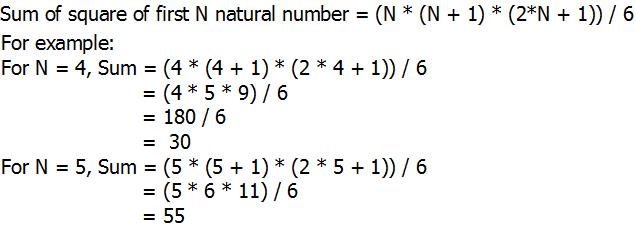



Python Program For Sum Of Squares Of First N Natural Numbers Geeksforgeeks



Www Jstor Org Stable




1 2 2 3 3 4 N N 1 Formula Novocom Top
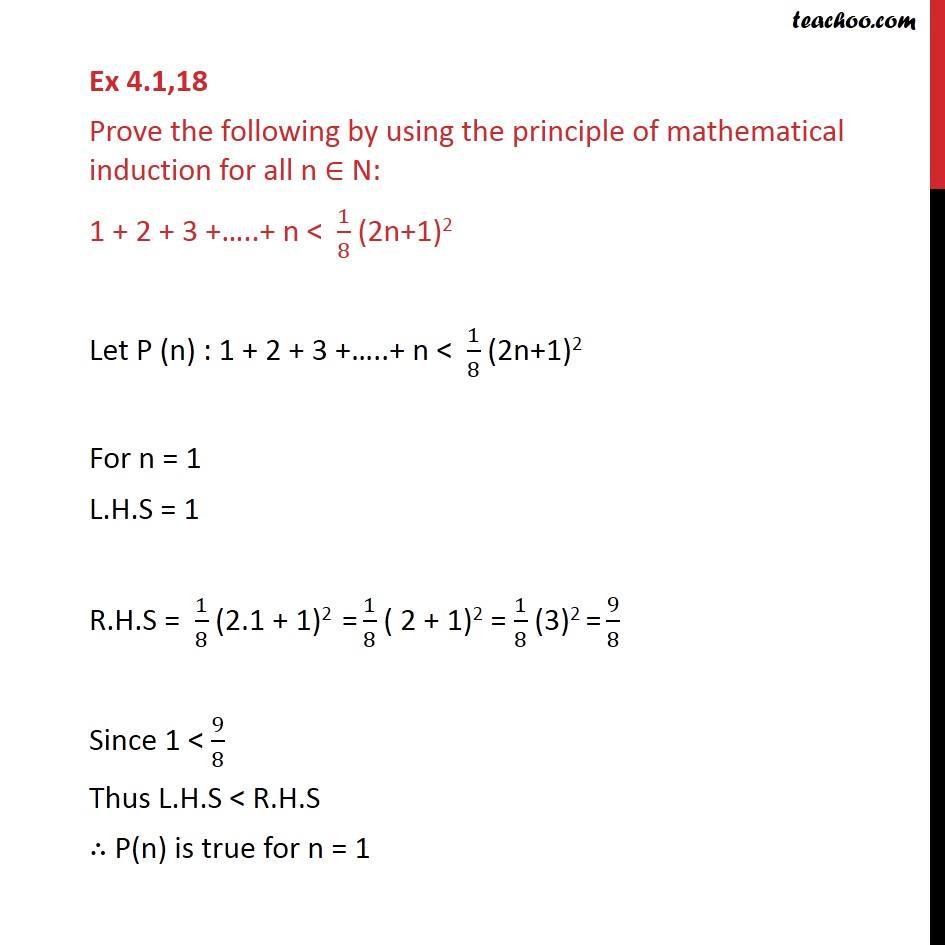



Ex 4 1 18 Prove 1 2 3 N 1 8 2n 1 2 Induction




Sum Of N N Or N Brilliant Math Science Wiki
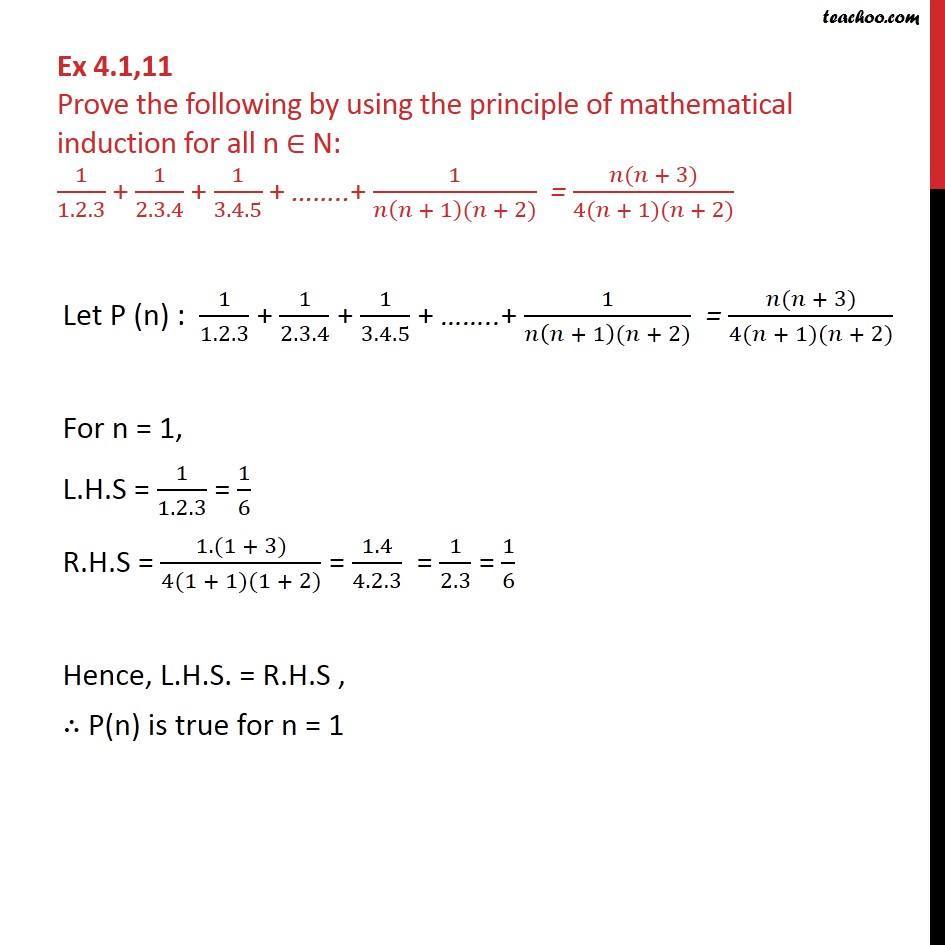



Ex 4 1 11 Prove 1 1 2 3 1 2 3 4 1 3 4 5 1 N N 1 N 2




Prove The Following By Using The Principle Of Mathematical Induction For All N N 1 3 1 1 5 4 1 7 9 1 2n 1 N 2 N 1 2 Mathematics Shaalaa Com




n2 Formula Proof




1 2 1 4 1 8 1 16 Wikipedia



Www Mtholyoke Edu Courses Jmorrow Calculus Ii Factexsolns Pdf




Proof Principle Of Mathematical Induction 22 Explained How To Show 1 2 2 2 3 2 N 2 Nn 12n 1 6 Youtube




Confusion About How To Prove Sum I 0 N 2 I 2 N 1 1 For All N Geq 0 By Induction Mathematics Stack Exchange




Understanding The Proof That The Series Sum Frac 1 N 2 Is Convergent Mathematics Stack Exchange



How To Prove By Induction That Math 2 N 2 3 2n 1 Math Is Divisible By 7 Quora
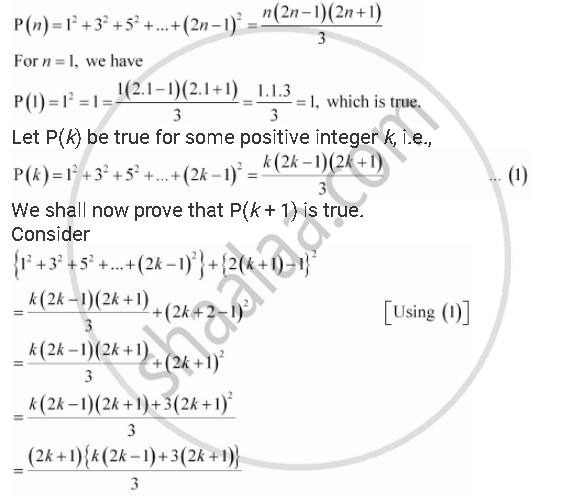



Prove The Following By Using The Principle Of Mathematical Induction For All N N 1 2 3 2 5 2 2n 1 2 N 2n 1 2n 1 3 Mathematics Shaalaa Com




Induction Help Prove 2n 1 2 N For All N Greater Than Or Equal To 3 Mathematics Stack Exchange
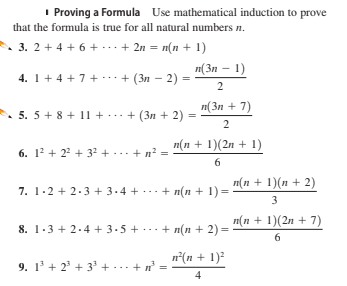



Answered I Proving A Formula Use Mathematical Bartleby




Proof Without Words 1 2 N 1 N Choose 2 Wolfram Demonstrations Project




2 Mathematical Induction 2 2 2 2 3 2 2 N 1 5 N 2 N Div By 3induccion Matematicas Mathgotserved Youtube



Combinatorial Proofs




Prove That 5 2n 1 3 2n 1 2 2n 1 Is Divisible By 15 For N In Mathbb N Mathematics Stack Exchange



0 件のコメント:
コメントを投稿